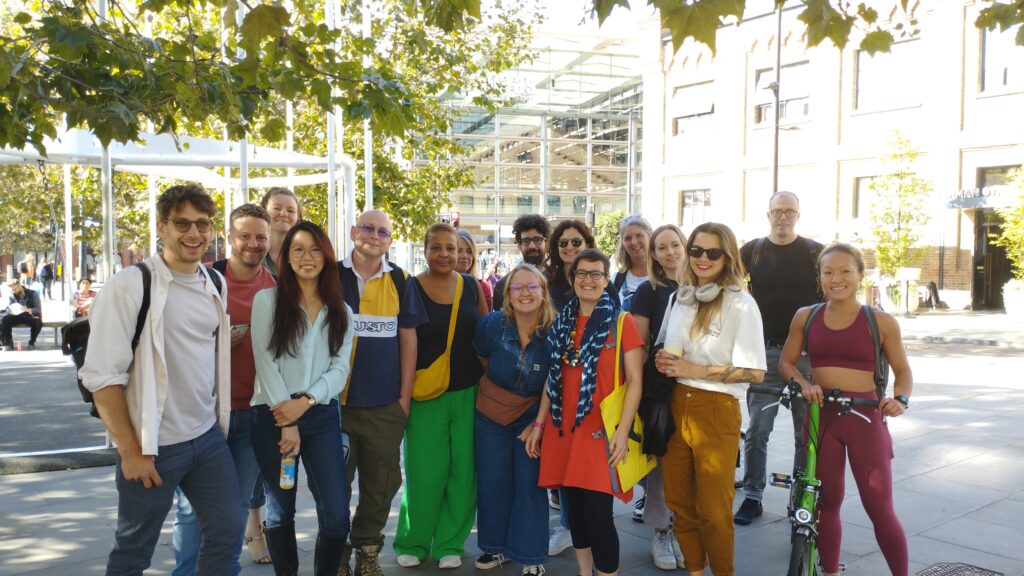One big myth about freelancing that I now know to be a big fat fib: other freelancers are always your competition. But I get it. Especially when you’re first starting out, it can feel like you need every advantage. It might not make sense to invest in relationships with people who could provide a similar service to your clients.
What if one of my leads sees the LinkedIn post that I liked, checks out their profile, and decides to go with them instead? What if I refer work to someone else when I’m too busy, and then they get the future business too? Totally understandable worries to have when you’re establishing yourself.
I can share that in my 4 years of freelancing, most of my clients have either been referrals from other freelancers, or freelancers themselves (and in turn, I’ve hired other freelancers to work with me!) I’ve also been a member of and helped build multiple freelancer-focused communities, and it’s something I’ve seen happen for lots of others, so I’m confident it’s not just a lucky streak I’m having!
So let’s break down the best reasons to see fellow freelancers as a community, not competition:
Reaching more potential clients
Despite what some LinkedIn job ads might suggest, it’s rare to find one person who can do absolutely everything. A moment of silence in particular for poor Social Media Managers who are also expected to be Graphic Designers, Strategists, Copywriters, Video Editors and Customer Care too…
Going freelance doesn’t mean you have to work alone. An example of a freelance match made in heaven is a Graphic Designer and a Copywriter for creative briefs, but if there’s another discipline that your discipline often works closely with, you could form your own duo (or trio, or more!)) to appeal as a ready-made team for tackling briefs. It’s also like having a whole other network to tap into, for even more potential clients, and someone else to help market your skills.
Sharing the load — literally
The bus analogy is very fitting for freelancing — one month nothing comes your way, and the next month you’ve got more requests than you can hop on to. It can be really tempting to say yes to everything and then deal with the consequences later, but it’s not fun.
It’s also good to consider the impact that being overstretched and tired will have on the quality of your work, and as a result, how that client feels about working with you again (and vice versa — it sucks not to be excited about a returning client because you associate them with feeling overwhelmed).
Knowing other freelancers who you think are awesome and do great work means you always have someone else you can recommend to new clients when your plate is a bit too full. Equally, what goes around usually comes around, and you’ll find other freelancers recommending you when they have too much on too.
Learning from your community, and adding value back
One brilliant thing that unites the freelance communities I’ve known is how generous people are with their time and knowledge. I’ve learned a lot from asking and listening to other freelancers and community & events folks, and I’ve been able to return the favour with my own experiences and expertise. It has helped me build my business, and it also gives me that warm fuzzy feeling (very welcome at this time of year!) to help others do the same.

How to be more tomato
Before you click away from this blog post and dive headfirst into every community you can find, (I shared a list of these in my last blog post!), I have a little bit more advice.
I call it being more ‘tomato’ (or how to be a good community member and get the most out of your community experience — I did a whole session on it for the Freelance Business Community which you can watch right here!)
- Don’t sell straight away — you’ve probably heard the phrase “people buy from people,” and it’s true. If you introduce yourself as a business before you introduce yourself as a person, that’s probably how your community will see you. Try starting with you, joining in with some discussions and starting your own to understand the vibe of the community, and then when the time is right, you’ll find people thinking how awesome it would be to work together (or what a good fit you might be for a client they know!)
- Help and ask for help — got a question that Google just can’t give you a straightforward answer for? Seen a question about something that you encounter everyday? One of the joys of community for freelancers is having a place you know you can go to for those gaps in your knowledge, or to help other people with theirs.
- Share your struggles and your wins — it’s tricky to get a gauge of what freelance life is like sometimes from social media, because it’s often a filtered view, like other parts of our lives. Thankfully, there are some very cool people (like Emma Cownley — do check her YouTube channel) who share the good and the bad, and it’s one of the best things about freelance communities. Sharing when it’s ‘one of those days’ and having your community respond with support, or a permission slip, can be just the little lift you need to keep going, and little wins feel even sweeter when you have others to celebrate with who really ‘get it’ — telling your mum is also nice, but sometimes the lengthy explanation can take the shine off…
If you’re a freelancer, or a freelance-focused business owner that would love more insights like this delivered to your inbox, sign yourself up here!

